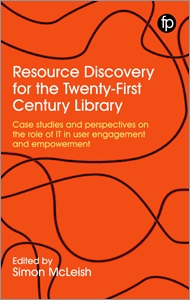
Primary tabs
You don't need to be an ALA Member to purchase from the ALA Store, but you'll be asked to create an online account/profile during the checkout to proceed. This Web Account is for both Members and non-Members.
If you are Tax-Exempt, please verify that your account is currently set up as exempt before placing your order, as our new fulfillment center will need current documentation. Learn how to verify here.
- Description
- Table of Contents
- About the author
- Reviews
Discovery is central to academic activities at all levels, and is a major focus for libraries and museums. This book will help its readers learn how to adapt in a fast changing area to continue to serve their communities.
Resource Discovery for the Twenty-First Century Library contains a range of contributions analyzing the ways in which libraries and museums (and others) are tackling the challenges facing them in discovery in the (post)-Google era. Chapters are written by experts, both global and local – describing specific areas of discovery and local implementations and ideas. The book will help with enhancing discovery both inbound – making locally held resources globally discoverable – and outbound – making global resources locally discoverable – in ways which are relevant to your user community. Content covered includes:
- a survey of what resource discovery is today;
- analysis of how users approach discovery;
- using limited resources to help users find collections;
- discussion of the special requirements of and solutions for archives and museums;
- the role museum and library discovery plays in learning and teaching;
- linked open data and discovery; and
- the future of discovery.
This book will be useful for subject librarians and others who give direct support to library users, digital library technicians, managers, staff with responsibility for managing electronic resources, metadata and discovery specialists, trainers and user education specialists. It will also be of use to curators and others who give direct support to researchers, managers of digitization and cataloging products, IT staff, trainers and user education specialists in archives and museums.
Contributors
Introduction
PART 1: Background
1. What is resource discovery today? – Simon McLeish
2. How users approach discovery – Frankie Wilson
PART 2: Helping Users Find Information around the Globe
3. Google and Google Scholar – Karen Blakeman
4. Case Study: Discovering journal articles through publisher/aggregator websites
5. Case Study: ArXiV – Building a service for specific subject needs – David Ruddy
6. Case Study: discovery through a library central index – EBSCO
7. Exposing collections and resources effectively
8. Discovery in learning and teaching – James Prag
PART 3: Meeting Local Requirements
9. Designing and building discovery with open source – Chris Awre
10. Across one nation: Themes and variations across the uk – Neil Grindley
11. Case Study: National Library and archives of Singapore – Chris Tang
12. Case Study: Australian National University
PART 4: Innovations and the Future
13. The future of discovery services – Marshall Breeding
14. Linked open data and discovery – Richard Wallis
15. Case Study: Enhancing discovery using linked open data – Dominic Oldman
16. Applying future innovations to discovery
Concluding remarks
Simon McLeish
Simon McLeish is Resource Discovery Architect at the Bodleian Libraries, University of Oxford, UK, and previously worked at the London School of Economics and Political Science (LSE) and as an independent IT professional, specializing in Identity and Access Management.
"This collection is recommended for librarians and library school students exploring access to information using the current library and free web-based discovery tools."
— Serials Review
"Offers a thoughtful collection of perspectives on the present and the foreseeable future of discovery. It acknowledges the power and influence of web-based discovery tools without losing sight of the public mission and ultimately broader horizons which libraries seek to make accessible to and useful for the communities they serve."
— Technicalities


